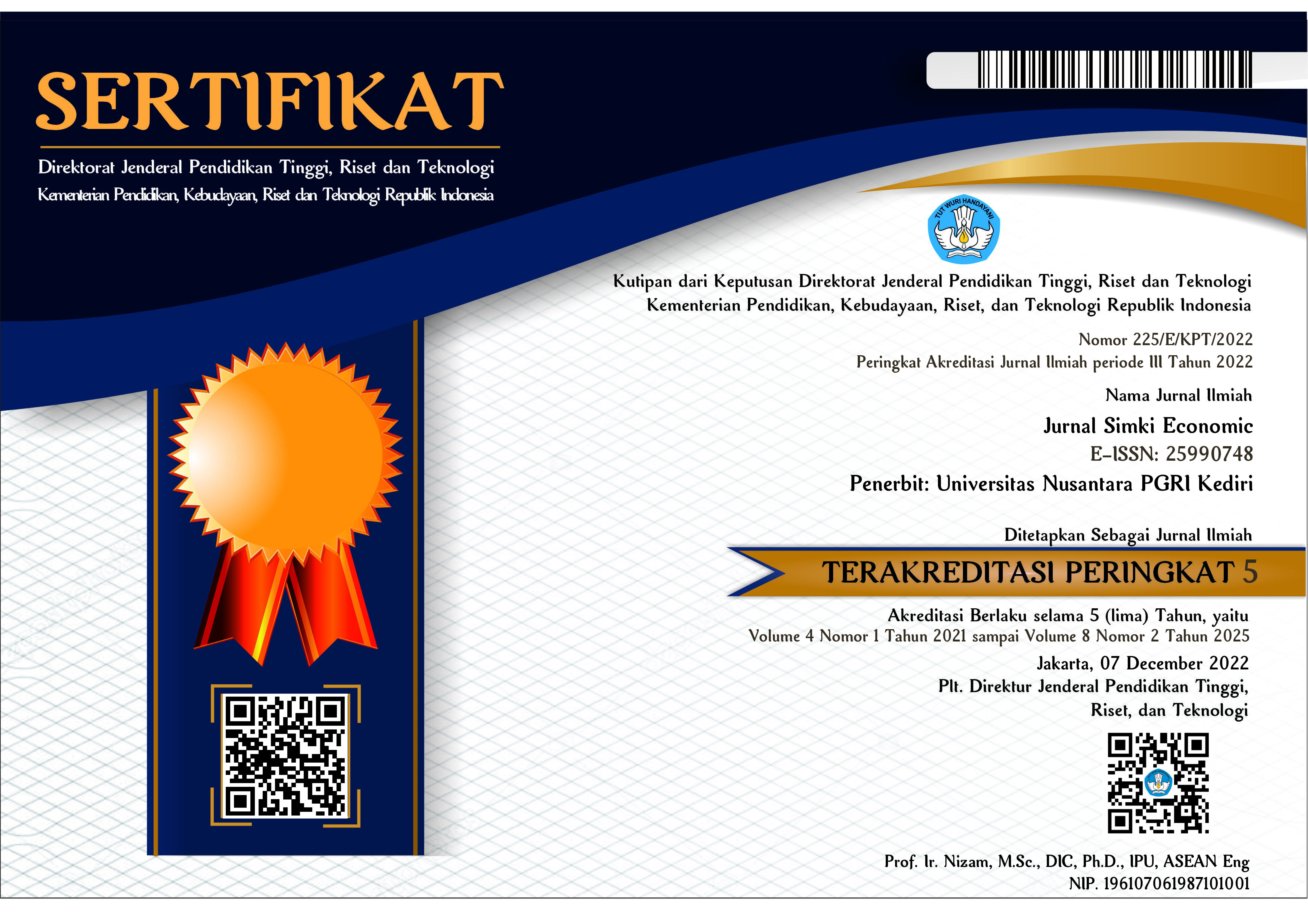Studi Tentang Peran Kualitas Kehidupan Kerja, Kepemimpinan dan Persepsi Dukungan Organisasi Terhadap Komitmen Organisasi
 Abstract views: 5457
,
Abstract views: 5457
,
 PDF (Bahasa Indonesia) downloads: 4902
PDF (Bahasa Indonesia) downloads: 4902
Abstract
Organizational commitment is a topic that continues to grow because it is assessed by academics and practitioners as an important variable to determine employee behavior and performance in organizations. The purpose of this study was to determine the effect of quality of work life, leadership, and perceived organizational support on organizational commitment. Respondents are employees in a company engaged in retail in the city of Surabaya with a total of 149 people. The analysis tool is multiple linear regression. The results of the study stated that the quality of work life, leadership, and perceived organizational support have a significant influence partially and simultaneously on organizational commitment.
Downloads
References
Avolio B. J., Zhu W., Koh, W., & Bhatia P. 2004. Transformational leadership and organizational commitment: Mediating role of psychological empowerment and moderating role of structural distance. Journal of Organizational Behaviour, 8(25), 951-968.
Caldwell, C., Truong, D. X., Linh, P. T., & Tuan, A. 2011. Strategic Human Resource Management as Ethical Stewardship. Journal of Business Ethics.
Dale, K., & Fox, M. L. 2008. Leadership Style and Organizational Commitment: Mediating Effect of Role Stress. In Journal of Managerial Issues (Vol. 20, pp. 109–130). Pittsburg State University.
Efraty, D., Sirgy, M. J. & Siegel P. 2000. The job/life satisfaction relationship among Professional accountants: psychological determinants and demographic differences. E. Diener and D. Rahtz. (Ed). Advances in Quality of Life Theory and Research (pp. 129-157). Klumer Academic Publishers, Social Indicators Research Series, Volume, 4.
Eisenberger, R., Fasolo, P. & Lamastro V. D. 1990. Perceived Organizational Support and Employee Diligence, Commitment, and Innovation. Journal of Applied Psychology, 75(1), 51-59.
Eisenberger, R., Huntington, R., Hutchison, S. & Sowa, D. 1986. Perceived Organizational Support. Journal of Applied Psychology, 71(3), 500-507.
Eisenberger, R., Stephen A., Rexwinkel B., Lynch P. D. & Rhoades, L. 2001. Reciprocation of Perceived Organizational Support. Journal of Applied Psychology, 86, 42–51.
Farjad, H.R. & Varnous, S. 2013. Study of Relationship of Quality of Work Life (QWL) and Organizational Commitment, Interdisciplinary Journal of Contemporary Research in Business, 4(9), 449-456.
Gunawan, Aditya. 2015. Perilaku Organisasi. Spektrum Nusa Press, Jakarta
Huang, T.C., Lawler, J. & Lei C.Y. 2007. The Effects of Quality of Work Life on Commitment and Turnover Intention. Social Behavior and Personality, 2007, 35(6), 735-750.
Koonmee, K. & Virakul, B. 2007. Ethics, Quality of Work life, and Employee job-related outcomes: A survey of HR and Marketing managers in Thai business. Presented at The 2007 ISQOLS Conference (From QOL Concepts to QOL Performance Measures), December 6-9, 2007, San Diego Marriott Mission Valley, San Diego, California.
Lee D.J., Singhapakdi A. & Sirgy, M. J. 2007. Further Validation of a Need-based Quality of Work Life (QWL) Measure: Evidence from Marketing Practitioners. Applied Research Quality of Life, 2, 273-287.
Lussier, R., & Achua, C. F. 2000. Leadership: Theory, Application, Skill Development
Mathieu, J. E. & Zajac, D. M. 1990. A review and meta-analysis of the antecedents, correlates, and consequences of organizational commitment. Psychological Bulletin, 10(8), 171-188.
Meyer, J. P. and Allen N. J. 1997. Commitment in the Workplace Theory, Research and Application, Sage Publications.
Meyer, J.P., Allen, N.J. & Smith, C.A. 1993. Commitment to Organizations and Occupations: Extension and Test of a Three-Component Model, Journal of Applied Psychology, 78 (4), pp. 538-551.
Meyer, J.P., Stanley, D. J., Herscovitch, L., & Topolnytsky, L. 2002. Affective, continuance and normative commitment to the organization: A metaanalysis of antecedents, correlates, and consequences. Journal of Vocational Behavior, 61, 20-52.
Mowday, R. T., Porter, L., & Steers, R. M. 1982. Employe-Organization Linkages: The Psychology of Commitment, Absenteeism & Turnover. Academic Press.
Ortiz, D. C. 2010. Organizational Commitment & Its Antecedents: Empirical Evidence from a Developing Country.
Özdevecioğlu, M. 2003. Algılanan Örgütsel Destek İle Örgütsel Bağlılık Arasındaki İlişkilerin Belirlenmesine Yönelik Bir Araştırma. Dokuz Eylül Üniversitesi İ.İ.B.F. Dergisi, 18(2), 113-130.
Randall, D. M., Cote, J. A., Randall, D. M., & Cote, J. A. 1991. Interrelationships of Work Commitment Constructs. Work and Occupations.
Rhoades, L. & Eisenberger, R. 2002. Perceived Organizational Support: A Review of the Literature. Journal of Applied Psychology, 87(4), 698–714.
Schein, Edgar H. 2011. Perilaku Organisasi dan Kepemimpinan. Alih Bahasa Rohiat. Edisi Keempat. Penerbit Refika Aditama, Bandung.
Seniati, L. 2006. Pengaruh masa kerja, trait kepribadian, kepuasan kerja dan iklim psikologis terhadap komitmen dosen pada universitas indonesia. Makara, sosial humaniora, 2(10), 88-97.
Sirgy, M. J., Efraty, D., Siegel, P. & Lee, D. J. 2001. A New Measure of Quality of Work Life (QWL) Based on Need Satisfaction and Spillover Theories. Social Indicators Research, 55, 241-302.
Sirgy, M. J., Reilly, N., Wu J. & Efraty, D. 2008. A Work-Life Identity Model of Well-Being: Towards a Research Agenda Linking Quality-of-Work-Life (QWL) Programs with Quality of Life (QOL). Applied Research in Quality of Life, 3(3), 181-202.
Yahaya, R. and F. Ebrahim. 2016 Leadership styles and organizational commitment. Literature review. Journal of Management Develompment, 35 (2) : 190-216
Copyright (c) 2021 Didit Darmawan, Rahayu Mardikaningsih

This work is licensed under a Creative Commons Attribution 4.0 International License.














